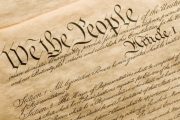On December 31, 2011, with the President’s signing of the National Defense Authorization Act(NDAA), the writ of habeas corpus — a civil right so fundamental to Anglo-American common law history that it predates the Magna Carta — is voidable upon the command of the President of the United States. The Sixth Amendment right to counsel is also revocable at his will.
The United States, as Senator Lindsey Graham declared during floor debate in the Senate, is now a theatre in the War on Terror and Americans “can be detained indefinitely … and when you say to the interrogator, ‘I want my lawyer,’ the interrogator will say, ‘You don’t have a right to a lawyer because you’re a military threat.'”
Don’t worry, though. Although the President now wields this enormous power, he adamantly denies that he will ever “authorize the indefinite military detention without trial of American citizens.” That guarantee is all that stands between American citizens and life in prison on arbitrary charges of conspiring to commit or committing acts belligerent to the homeland.
The President continued by explaining that to indefinitely detain American citizens without a trial on the charges laid against them “would break with our most important traditions and values as a nation.”
Ironically, the signing statement in which President Obama gave these assurances is itself violative of the Constitution, the separation of powers established therein, and only demonstrates his proclivity for ignoring constitutional restraints on the exercise of power once those powers have been placed (albeit illegally) by a complicit Congress at his disposal.
Once development of it begins in the body politic, the muscle of tyranny never atrophies.
Supporters of the law (including President Obama) point to the “undeniable” success achieved against “suspected terrorists.” Although President Obama claims that the section of the NDAA (1021) authorizing the President to detain these suspects “breaks no new ground and is unnecessary,” the President’s interpretation of just who inhabits the universe of likely suspects (as explained in the signing statement appended to the NDAA) includes “al-Qa’ida and its affiliates and adherents….”
Since the beginning of hostilities in the wake of 9/11, the federal government has often had problems proving membership in al-Qaeda of those arrested as “enemy combatants” in the War on Terror, so imagine the difficulty they would face in presenting evidence of affiliation or adherence to that shadowy, ill-defined organization.
The danger of the vagueness of crucial terms of the NDAA was addressed by current Republican presidential contender Congressman Ron Paul (R-Texas) during a phone conference with supporters in Iowa:
The dangers in the NDAA are its alarmingly vague, undefined criteria for who can be indefinitely detained by the US government without trial. It is now no longer limited to members of al Qaeda or the Taliban, but anyone accused of “substantially supporting” such groups or “associated forces.” How closely associated? And what constitutes “substantial” support? What if it was discovered that someone who committed a terrorist act was once involved with a charity? Or supported a political candidate? Are all donors of that charity or supporters of that candidate now suspect, and subject to indefinite detainment? Is that charity now an associated force?
The Bill of Rights has no exemption for “really bad people” or terrorists or even non-citizens. It is a key check on government power against any person. That is not a weakness in our legal system; it is the very strength of our legal system. The NDAA attempts to justify abridging the Bill of Rights on the theory that rights are suspended in a time of war, and the entire Unites States is a battlefield in the War on Terror. This is a very dangerous development indeed. Beware.
Fortunately for the President, the NDAA absolves him of the requirement of gathering and presenting to an impartial judge evidence probative of such evil associations. The mere suspicion of such suffices as a justification for the indefinite imprisonment of those so suspected.
As if the foregoing roster of Stalinist-style authoritarianism isn’t an imposing enough threat to freedom, there is an additional aspect of the new law that places the civil liberties of Americans in greater peril.
The NDAA places the American military at the disposal of the President for the apprehension, arrest, and detention of those suspected of posing a danger to the homeland (whether inside or outside the borders of the United States and whether the suspect be a citizen or foreigner). The endowment of such a power to the President by the Congress is nothing less than a de facto legislative repeal of the Posse Comitatus Act of 1878, the law forbidding the use of the military in domestic law enforcement.
Again, the aforementioned Senator Lindsey Graham has no qualms shredding that parchment protection from tyranny, either. Said Graham: “I don’t believe fighting al Qaeda is a law enforcement function. I believe our military should be deeply involved in fighting these guys at home and abroad.”
The undeniable unconstitutionality of the National Defense Authorization Act and its violation of the Posse Comitatus Act is likely to result in the necessity of states nullifying those sections of the law that exceed the enumerated powers of Congress. This remedy would be applied by the legislatures of the states in an effort to protect its citizens from arrest and extradition by armed members of the federal armed forces. This effort to resist unfettered federal authority would rival the intensity of the Nullification Crisis of the 1830s — a confrontation that culminated in the Civil War and the death of at least 600,000 Americans.
While the frightening abolition of civil liberties contained in the NDAA could not have been codified were it not for the signature of President Obama, the complicity of the Congress in easing our Republic’s “slip into tyranny” should not be overlooked.
Sixty-eight percent of the House of Representatives voted for this measure, for example. Perhaps in the elections of 2012 those lawmakers who voted in favor of the measure will be held accountable by their constituents for such an inexplicable violation of the congressional oath of office and its requirement that members protect the Constitution from all enemies, foreign and domestic.
Other sections of the 500-plus-page, $662-billion law authorizes the continued expenditure of money on the perpetuation of two unconstitutional foreign conflicts (Iraq and Afghanistan), as well as greasing the skids for the deployment of the American military into Iran if economic sanctions fail to persuade Mahmoud Ahmadinejad to see things our way.
While the NDAA’s effect on the Constitution is all but ignored by the administration and Congress, its effect on oil prices is taken very seriously. Under applicable provisions of the new law, President Obama may punish international firms which buy oil from Iran. President Obama has an out, however, if he believes that the imposition of such penalties is driving up the price of crude.
The New York Times quotes an unnamed administration official who explains the importance of vigilantly protecting the stability of the volatile oil market: “We have to do it in a timely way and phased way to avoid repercussions to the oil market, and make sure the revenues to Iran are reduced.”
Finally, President Obama signed the NDAA, and the depth of the impact of this law on the freedom of Americans and the perpetuation of our Constitution cannot be measured. Promises to restrain oneself from abusing power are unreliable. As Thomas Jefferson once warned:
Free government is founded in jealousy, not confidence. It is jealousy and not confidence which prescribes limited constitutions, to bind those we are obliged to trust with power…. In questions of power, then, let no more be heard of confidence in men, but bind him down from mischief by the chains of the Constitution.
Related article:
Ron Paul Calls National Defense Authorization Act “Slip Into Tyranny”




